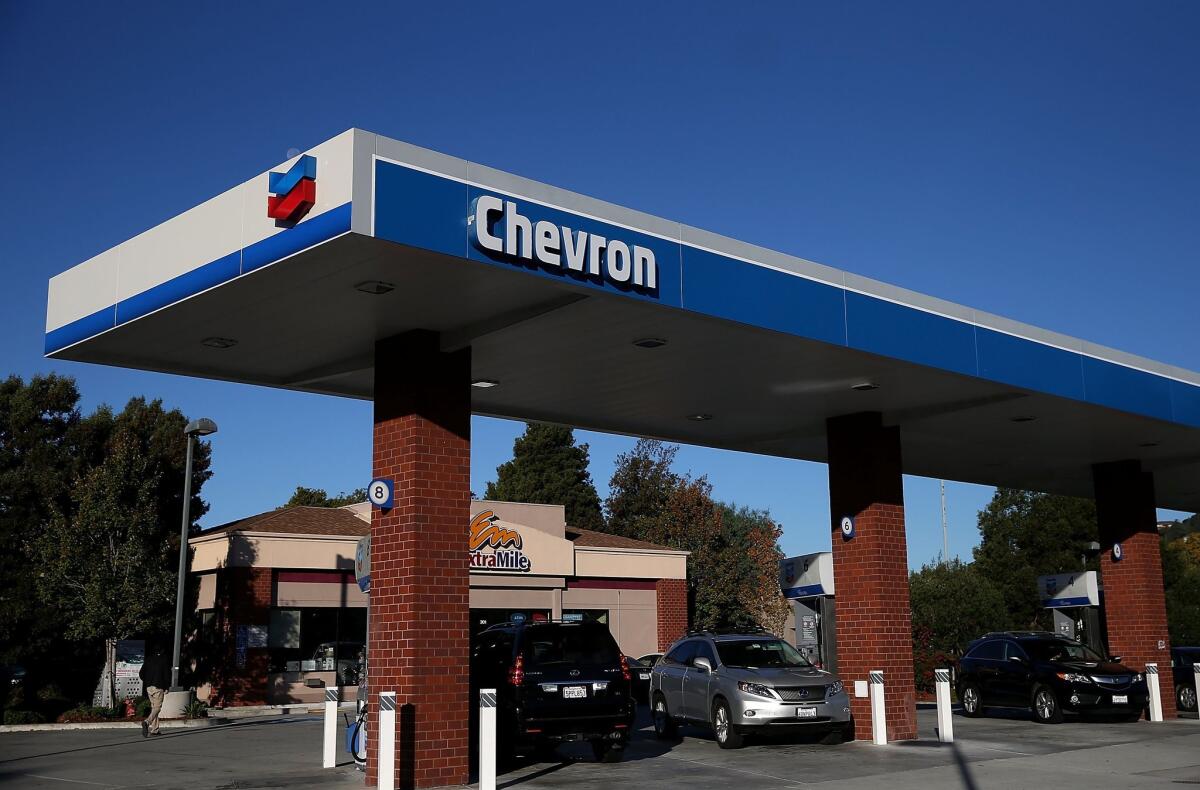Oil industry pumped cash into lobbying as fight over energy bill raged

A Chevron station in Greenbrae, Calif. The company contributed $1.8 million to oil industry lobbying efforts to block climate change legislation.
Reporting from Sacramento — During a pitched battle over climate change legislation this year, the petroleum industry dramatically ramped up its spending on lobbying, new disclosures show.
More than a dozen oil companies or industry groups spent almost a total of $11.3 million on lobbying from July 1 to Sept. 30, as the fight over a key provision of the measure reached its peak.
The largest portion was $6.7 million spent by the Western States Petroleum Assn., the industry’s main lobbying arm in California. That’s more than twice what it spent in the first six months of 2015.
A spokesperson for the trade group declined to comment on the spending, reported in filings the state requires from lobbyists and their employers.
The focus of the battle was a measure intended to increase energy efficiency, boost renewable energy and vastly reduce oil consumption for transportation. After furious industry lobbying and resistance from some business-friendly Democrats in the Assembly, the petroleum target was dropped from the bill, which Gov. Jerry Brown signed into law in October.
Lobbying efforts were intense from both critics and supporters of the bill. NextGen Climate Action, an organization founded by San Francisco billionaire Tom Steyer, spent $1.2 million lobbying in favor of the bill during the same period.
But the oil and energy sectors vastly outspent their environmental critics.
Chevron, the state’s largest oil company, spent $1.8 million during the summer. Notable increases from early 2015 lobbying efforts were also reported by BP America, Exxon Mobil and Valero.
The state’s three largest utilities — Southern California Edison, Sempra and PG&E — spent a combined $1.35 million during the three months covered by the reporting period.
The lobbying records also reveal how a handful of key legislators were courted by the powerful energy industry during the heat of the fight over the bill, SB 350.
The oil group paid for Assembly members Rudy Salas (D-Bakersfield), Jim Frazier (D-Oakley) and Mike Gipson (D-Carson) to stay at the Ritz Carlton in Half Moon Bay during a conference three weeks after the legislative session ended. All three of the lawmakers had expressed reservations about the oil-reduction target.
Sempra Energy, one of the utilities with an interest in the negotiations, treated Assemblyman Henry Perea (D-Fresno) to a Dodgers game and dinner in late July. Perea was a key Democratic vote in the lower house and successfully led a charge to strip the bill of its limits on the use of gas in vehicles.
The bill’s author, Senate President Pro Tem Kevin de León (D-Los Angeles), was also courted by those who initially resisted the bill. Reports filed by Southern California Edison show that company officials paid for dinner with De León on Aug. 20 at a downtown Los Angeles restaurant, Faith and Flower.
Although the reports offer a glimpse of the efforts to influence the debate over the high-profile bill, they don’t reveal information on the broader public relations campaign that both sides were also waging. Money spent on those efforts is lumped into a category called “other payments to influence” and does not have to be disclosed in detail.
Steyer’s group spent more than $1 million on such efforts, the vast majority of its reported lobbying effort for the summer months. Gil Duran, a spokesman for the organization, said the money included advertising and direct-mail efforts to promote SB 350.
“We simply cannot afford to let people only hear Big Oil’s side of the story,” Duran said in an email.
Twitter: @chrismegerian
Twitter: @johnmyers
Follow @chrismegerian for more updates from Sacramento.
For more political coverage, go to www.latimes.com/politics.
More to Read
Get the L.A. Times Politics newsletter
Deeply reported insights into legislation, politics and policy from Sacramento, Washington and beyond. In your inbox three times per week.
You may occasionally receive promotional content from the Los Angeles Times.












